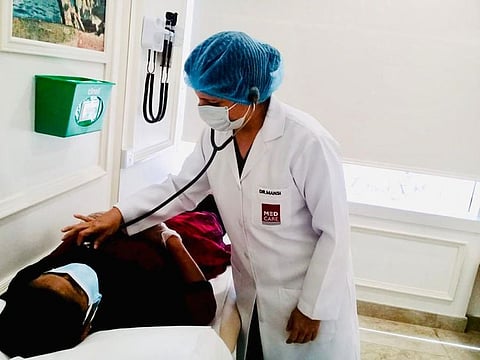COVID-19 fallout: UAE hospital operators call for relief on utility bills
Steep fall in outpatient visits in recent weeks is pushing healthcare business to the edge

Dubai: Leading hospital operators in the UAE have requested utility charge and fee waivers from the Government to ease their current cashflow problems.
“It would be a great help if electricity and power charges for hospitals and clinics can be deferred or foregone by the authorities,” said Dr. Azad Moopen. Chairman and Managing Director at Aster DM Healthcare. “There are already committees formed by the federal government to oversee the healthcare industry’s response to COVID-19. We have made representations to them saying these are the requirements.
“The government’s been quite receptive – we are hopeful of some progress soon enough.”
It is imperative for the sector to remain stable and sustainable if we have to win this war

In the last three weeks, UAE’s hospitals and clinics have seen declines of 60-70 per cent in outpatient visits as residents put off all non-essential trips to healthcare facilities. Also in decline are elective surgeries – those that do not require immediate procedures – and this has meant cashflow is proving to be a problem for the healthcare industry.
Another suggestion would be to get “viability gap funds” to be released to hospital and clinic operators. “These funds, if released, will help is to meet our expenses and to remain sustainable —- not to make profits,” Dr. Moopen said. (Viability gap funding is a one-time grant provided to support projects that are economically justified but fall short of financial viability.)
“Healthcare is in the epicenter of the war against coronavirus with the doctors, nurses and support staff front-line soldiers. It is imperative for the sector to remain stable and sustainable if we have to win this war - short term as well as long haul.
“Looking at the cost structure , it doesn’t appears private healthcare is sustainable without support. With 50 per cent plus of the monthly cost being the fixed HR component, it is impossible for the business to continue when revenues go down significantly.
“This is all the more so as insurance payments and receivables are to the tune of 120 days DSO (days sales outstanding).I am very much thankful to the DHA for directing the insurance companies to pay pending dues to healthcare providers immediately. If we receive this , there will be significant relief in cash flow “
Banks too need to listen
Meanwhile, healthcare professionals says banks too need to do their bit. “We are in talks with our lender banks to defer upcoming repayments,” said Singaram Annamalai, Chief Financial Officer at Prime, which operates a hospital and 15 clinics in the UAE. “One of the banks has shown interest – we need others to do the same.
“The healthcare industry needs to be given loans and working capital funds at lower or even zero interest. The answer to the healthcare industry’s current problems is not slash the salaries of doctors, nurses and other staff. They are the front-line… their morale cannot suffer through such steps.
“The industry needs help and banks need to support us.”
Banks are yet to provide funds at lower interest rates








